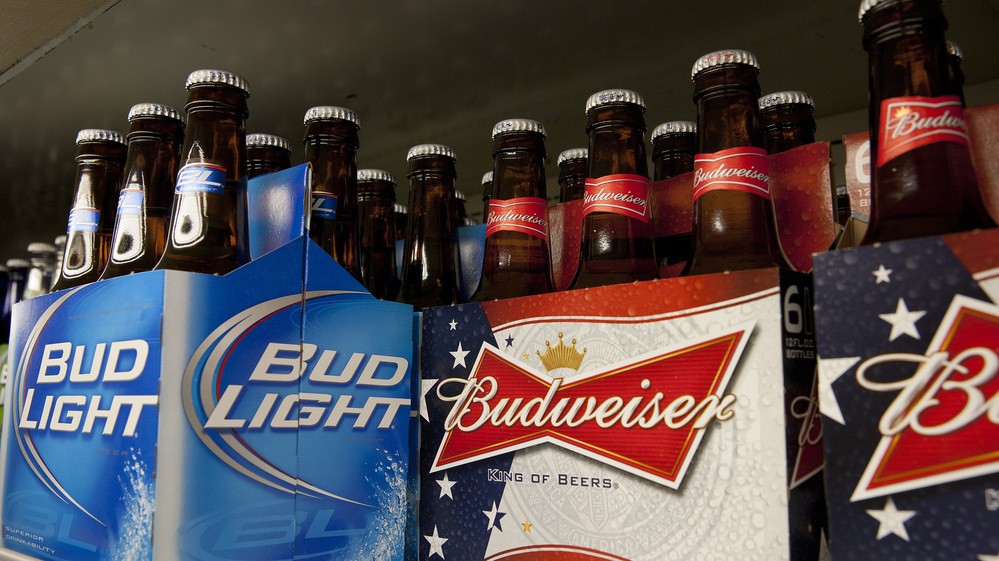 Enlarge image i
Enlarge image i Plaintiffs accuse Anheuser-Busch of misleading consumers about the alcohol content in Bud Light, Budweiser and other products. The brewer denies the claims.

Plaintiffs accuse Anheuser-Busch of misleading consumers about the alcohol content in Bud Light, Budweiser and other products. The brewer denies the claims.
Anheuser-Busch is accused of misleading beer drinkers about the alcohol content of Budweiser and other products, in lawsuits filed against the brewer in several federal courts. The plaintiffs say Anheuser-Busch waters down its beers and then misrepresents their final alcohol content. The brewer says the lawsuits have no merit.
Like many mainstream U.S. beers, Budweiser has long been accused of tasting watery and low-powered in comparison with strong and flavorful American craft and European traditional brews. But the lawsuit's main contention is not that a crime against taste has been committed.
The plaintiffs allege intentional "mislabeling" of at least 10 beers' alcohol content, after the brewer added water to boost the amount of beer produced from raw materials. The suit also accuses the giant brewer of engaging in false advertising and unfair business practices.
Peter Kraemer, Anheuser-Busch InBev's vice president of brewing and supply, calls the lawsuits' claims "completely false," in an email to Bloomberg News. "Our beers are in full compliance with all alcohol labeling laws," Kraemer says.
The lawsuit, versions of which were filed in California, Pennsylvania, New Jersey and elsewhere, seeks a broad classification that would allow it to represent millions of consumers.
On Twitter and other social media networks, news of the lawsuit was greeted by jeers and jokes. But the practice of adding water to beer before it's packaged is common among large brewers. It's called high-gravity brewing, and it involves blending a potent brew with water.
The process is very efficient and that can mean higher profits for companies like Anheuser-Busch InBev, the world's largest brewer.
"In high-gravity brewing, you can make a lot more beer by stretching the beer that you have fermented," explains Dan Kopman, co-founder of Schlafly Beer, a craft brewery in Anheuser-Busch's ancestral home of St. Louis. (AB InBev is now headquartered in Belgium.)
Kopman says that adding water can help a brewer "stretch" the amount of the final product by at least 5 or 10 percent without changing the beer's flavor.
"This is primarily done in very large breweries, and it works well for lighter lager beers," he tells The Salt. "I would assume that all major brewers in the world high-gravity brew. It is not unique to AB."
As an example, Kopman says, Anheuser-Busch might brew high-gravity Bud, with an alcohol content of around 5.5 percent after fermentation.
"Then in packaging they will add deaerated water," he says, to achieve the desired flavor and alcohol content. Deaerated water has low oxygen levels, to help the beer "keep" on the shelves.
Brewers who use this process monitor alcohol content closely; most also verify it with a lab test after packaging. But that's where the newly filed lawsuit claims there are problems. The plaintiffs say the alcohol content printed on Budweiser, Bud Ice, Michelob and other beers' labels isn't accurate and that the discrepancy is intentional.
"AB never intends for the malt beverage to possess the amount of alcohol that is stated on the label," according to the suit, which also says Anheuser-Busch has the ability to measure alcohol content to a hundredth of a percent.
"As a result, AB's customers are overcharged for watered-down beer," the lawsuit claims, "and AB is unjustly enriched by the additional volume it can sell."
The suit claims that the practice of watering down beers was "vigorously accelerated" after Anheuser-Busch merged with InBev to form a mammoth global corporation in 2008. But the documents posted online do not cite lab tests of the beers.
"Our information comes from former employees at Anheuser-Busch, who have informed us that, as a matter of corporate practice, all of their products mentioned [in the lawsuit] are watered down," Josh Boxer, a lead attorney in the lawsuit, tells The Associated Press.
But Boxer "stopped short of saying the beers had been independently tested," the AP reports. And the lawsuit doesn't cite specific numbers to back up its claim, saying only that Budweiser has "significantly lower alcohol content" than what its label announces.
Two plaintiffs in the California suit, Nina Giampaoli and John Elbert, say they regularly purchased Budweiser over the past four years, taking the "stated percentage of alcohol into account" when they made their decisions to buy the beer.
Documents posted online to support the lawsuit include a Dec. 18, 2012, letter in which Boxer offers Anheuser-Busch a chance to "replace, refund or otherwise rectify the violations" on behalf of consumers who bought the brewer's products in the past four years. The suit says it will seek more than $5 million.
In a financial report released Wednesday, AB InBev said its fourth-quarter profit dipped slightly, to $2.5 billion. For 2012, the corporation reported a $9.4 billion profit a 19 percent rise, despite revenue growth of just 2 percent compared with 2011.
No comments:
Post a Comment